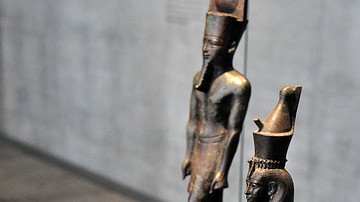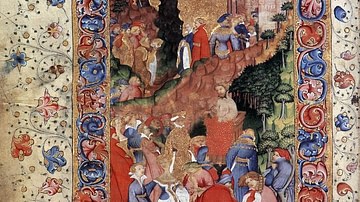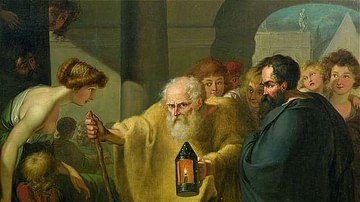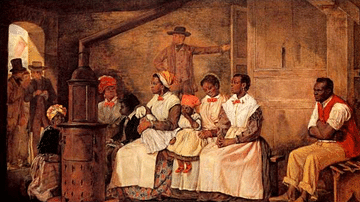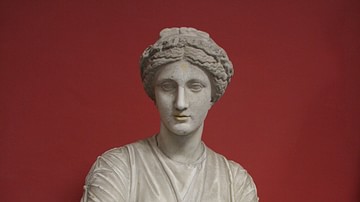T. R. Dew's A Review of the Debate in the Virginia Legislature of 1831 and 1832 is a pro-slavery work written in response to calls for emancipation of the slaves of Virginia in the wake of Nat Turner's Rebellion of August 1831. Emancipation and colonization of Virginia's enslaved populace were being seriously considered until Dew's work ended the conversation.

Thomas Roderick Dew (l. 1802-1846) was a professor of history and political law at The College of William & Mary in Williamsburg, Virginia (and, later, the college's 13th president). After Nat Turner's Rebellion, which resulted in the deaths of at least 55 White and 120 Black people in Southampton County, Virginia, Governor John Floyd (l. 1783-1837) "defended emancipation…as the only way to prevent further violence" (Oates, 135). If emancipation were not possible, Floyd suggested, then colonization (sending the slaves back to Africa) would work as well. The Virginia legislature debated the issue from the fall of 1831 through 1832. Scholar Stephen B. Oates writes:
While the Virginia press haggled over emancipation, Governor Floyd was plotting an executive move against the peculiar institution when the legislature convened in December. For some time, he had desired emancipation and colonization, and now Nat Turner had given him a golden opportunity to strike against slavery, to vanquish what he regarded as a wasteful labor system that impeded Virginia's commercial development.
(136-137)
In April 1832, Floyd invited Professor Dew to review the debates of the legislature and publish a clear-cut conclusion on the subject. Dew responded with A Review of the Debate in the Virginia Legislature of 1831 and 1832, which claimed slavery was ordained by God, that Blacks were destined to be slaves and Whites masters, and that emancipation could never work for many reasons, among them, because Blacks were content as slaves and would find freedom a disappointing burden. Oates writes:
When Dew's essay came out, Governor Floyd and most other Virginia whites embraced the professor's arguments "as final." If Nat Turner had forced Virginians, however fleetingly, to consider black liberation as a solution to their slave woes, Dew gave them a fund of excuses and rationalizations for their rejection of that possibility. Given their racial fears and attitudes, their investments and status symbols, their whole way of life really, Virginia whites were incapable of ever uprooting slavery by themselves. Small wonder, then, that they closed ranks behind Dew and dug in, inflexibly determined that slavery would remain.
(141)
Although Dew repeatedly claims that legislative action could never free the slaves owing to the God-given nature of Blacks and Whites, the "peculiar institution" was, in fact, ended by the Thirteenth Amendment to the Constitution in 1865.
Dew's racist ideology, thick with logical fallacies including hasty generalizations and fearmongering, is so patently absurd today that it is difficult to believe it was ever taken seriously. Dew was regarded, however, as "an expert in whom all Virginia reposed the greatest confidence" (Oates, 140), and his arguments carried enough weight to silence any further calls for the emancipation of the slaves of Virginia.
"Contentment" of the Slaves
Aside from the 250-311 slave revolts that took place between c. 1663 and 1860 – and The Confessions of Nat Turner giving his reasons for the 1831 uprising – there are many slave narratives contradicting Dew's version of reality, and, among the best-known are those of Harriet Jacobs (l. c. 1813-1897), Harriet Tubman (l. c. 1822-1913), Sojourner Truth (l. c. 1797-1883), and Frederick Douglass (l. c. 1818-1895). Jacobs, in her Incidents in the Life of a Slave Girl (1861), writes:
No pen can give an adequate description of the all-pervading corruption produced by slavery. The slave girl is reared in an atmosphere of licentiousness and fear. The lash and the foul talk of her master and his sons are her teachers. When she is fourteen or fifteen, her owner, or his sons, or the overseer, or perhaps all of them, begin to bribe her with presents. If these fail to accomplish their purpose, she is whipped or starved into submission to their will.
(45)
Douglass, in his Narrative of the Life of Frederick Douglass (1845), describes how slavery defined his relationship with his mother:
I never saw my mother, to know her as such, more than four or five times in my life; and each of these times was very short in duration, and at night. She was hired by a Mr. Stewart, who lived about twelve miles from my home. She made her journeys to see me in the night, traveling the whole distance on foot, after the performance of her day's work. She was a field hand, and a whipping is the penalty of not being in the field at sunrise, unless a slave has special permission from his or her master to the contrary – a permission they seldom get, and one that gives to him that gives it the proud name of being a kind master.
I do not recollect of ever seeing my mother by the light of day. She was with me in the night. She would lie down with me, and get me to sleep, but long before I waked she was gone. Very little communication ever took place between us. Death soon ended what little we could have while she lived, and with it her hardships and suffering. She died when I was about seven years old, on one of my master's farms, near Lee's Mill. I was not allowed to be present during her illness, at her death, or burial. She was gone long before I knew anything about it. Never having enjoyed, to any considerable extent, her soothing presence, her tender and watchful care, I received the tidings of her death with much the same emotions I should have probably felt at the death of a stranger.
(African American Classics, 352)
Compared with many other slave narratives, the two above might be considered mild, and yet they fully refute Dew's claims that slaves were content with their lot. The lengths to which Douglass' mother went just to spend a little time with her son also refutes Dew's assertion on the "idleness of blacks" and his frequently repeated claims that, if the slaves were freed, they would not know how to work for a living and would quickly turn to crime.
These arguments, and Dew's others – including how it was the Whites' responsibility to keep Blacks enslaved just as parents must care for wayward children – were absorbed, repeated, and defended by slaveholders and pro-slavery advocates up through the American Civil War and, in sometimes modified forms, afterwards.
Text
The following excerpt is taken from Review of the Debate [on the abolition of slavery] in the Virginia Legislature of 1831 and 1832 by Thomas Roderick Dew, pp. 95-102, as given on the site archive.org. It has been edited for space, with omissions indicated by ellipses.
We have now, we think, proved our position that slave labor in an economical point of view is far superior to free-negro labor; and have no doubt that, if an immediate emancipation of the negroes were to take place, the whole southern country would be visited with an immediate general famine, from which the productive resources of all the other states of the Union could not deliver them.
It is now easy for us to demonstrate the second point in our argument – that the slave is not only economically but morally unfit for freedom. And first, idleness and consequent want, are of themselves sufficient to generate a catalog of vices of the most mischievous and destructive character. Look to the penal prosecutions of every country and mark the situation of those who fall victims to the laws. And what a frightful proportion do we find among the indigent and idle classes of society!
Idleness generates want – want gives rise to temptation – and strong temptation makes the villain. The most appropriate prayer for frail, imperfect man is, "lead us not into temptation." Mr. Archer of Virginia well observed, in a speech before the Colonization Society, that "the free blacks were destined by an insurmountable barrier – to the want of occupation – thence to the want of food – thence to the distresses which ensue that want – thence to the settled deprivation which grows out of those distresses and is nursed at their bosoms; and this condition was not casualty but fate. The evidence was not speculation in political economy – it was geometrical demonstration."
We are not to wonder that this class of citizens should be so depraved and immoral. An idle population will always be worthless; and it is a mistake to think that they are only worthless in the Southern States, where it is erroneously supposed the slavery of a portion of their race depresses them below their condition in the free states: on the contrary, we are disposed rather to think their condition better in the slave than the free states.
Mr. Everett, in a speech before the Colonization Society, during the present year, says, "they (the free blacks) form in Massachusetts about one-seventy-fifth part of the population; one-sixth of the convicts in our prisons are of this class." The average number of annual convictions in the state of Virginia, estimated by the late Governor Giles, from the penitentiary reports, up to 1829, is seventy-one for the whole population – making one in every sixteen thousand of the white population, one in every twenty-two thousand of the slaves, and one for every five thousand of the free colored people. Thus, it will be seen, that crimes among the free blacks are more than three times as numerous as among the whites, and four and a half times more numerous than among the slaves. But although the free blacks have thus much the largest proportion of crime to answer for, yet the proportion is not so great in Virginia as in Massachusetts.
Although they are, relatively to the other classes, more numerous, making the one-thirtieth of the population of the state, not one-eighth of the whole number of convicts are from among them in Virginia, while in Massachusetts there is one-sixth. We may infer, then, that they are not so degraded and vicious in Virginia, a slave-holding state, as in Massachusetts, a non-slave-holding state. But there is one fact to which we invite particularly the attention of those philanthropists who have the elevation of the southern states so much at heart – that the slaves in Virginia furnish a much smaller annual proportion of convicts than the whites, and among the latter a very large proportion of the convicts consist of foreigners or citizens of other states.
There is one disadvantage attendant upon free blacks, in the slave holding states, which is not felt in the non-slave-holding. In the former, they corrupt the slaves, encourage them to steal from their masters by purchasing from them, and they are, too, a sort of moral conductor by which the slaves can better organize and concert plans of mischief among themselves.
So far, we have been speaking of the evils resulting from mere idleness; but there are other circumstances which must not be omitted in an enumeration of the obstacles to emancipation. The blacks have now all the habits and feelings of slaves, the whites have those of masters; the prejudices are formed, and mere legislation cannot remove them. "Give me," said a wise man, "the formation of the habits and manners of a people, and I care not who makes the laws."
Declare the negroes of the South free tomorrow and vain will be your decree until you have prepared them for it; you depress, instead of elevating. The law would, in every point of view, be one of the most cruel and inhumane which could possibly be passed. The law would make them freemen, and custom or prejudice, we care not which you call it, would degrade them to the condition of slaves; and soon should we see that it is happened unto them, according to the true proverb, "the dog is turned to his own vomit again, and the sow that was washed to her wallowing in the mire."
…It is better that each one should remain in society in the condition in which he has been born and trained, and not to mount too fast without preparation. If a Virginia or South Carolina farmer wished to make his overseer perfectly miserable, he could not better do it than by persuading him that he was not only a freeman, but a polished gentleman likewise, and consequently to induce him to enter his drawing room. He would soon sigh for the fields, and less polished but more suitable companions.
Hence, in the southern states, the condition of the free blacks is better than in the northern; in the latter, he is told that he is a freeman and entirely equal to the white, and prejudice assigns to him a degraded station. Light is furnished him by which to view the interior of the fairy palace which is fitted up for him, and custom expels him from it, after the law has told him it was his.
He consequently leads a life of endless mortification and disappointment. Tantalus-like, he has frequently the cup to his lips, and imperious custom dashes it untasted from him. In the southern states, law and custom more generally coincide; the former makes no profession which the latter does not sanction, and consequently the free black has nothing to grieve and disappoint him.
We have already said, in the course of this review, that if we were to liberate the slaves, we could not, in fact, alter their condition – they would still be virtually slaves; talent, habit, and wealth would make the white the master still, and the emancipation would only have the tendency to deprive him of those sympathies and kind feelings for the black which now characterize him. Liberty has been the heaviest curse to the slave, when given too soon…
The great evil, however, of these schemes of emancipation, remains yet to be told. They are admirably calculated to excite plots, murders, and insurrections, whether gradual or rapid in their operation, this is the inevitable tendency. In the former case, you disturb the quiet and contentment of the slave who is left unemancipated; and he becomes the midnight murderer to gain that fatal freedom whose blessings he does not comprehend. In the latter case, want and invidious distinction will prompt to revenge.
Two totally different races, as we have before seen, cannot easily harmonize together and, although we have no idea that any organized plan of insurrection or rebellion can ever secure for the black the superiority, even when free, yet his idleness will produce want and worthlessness and his very worthlessness and degradation will stimulate him to deeds of rapine and massacres, and thereby draw down on his devoted head the vengeance of the provoked whites.
But one limited massacre is recorded in Virginia history; let her liberate her slaves and, every year, you would hear of insurrections and plots and every day would perhaps record a murder; the melancholy tale of Southampton would not alone blacken the page of our history and make the tender mother shed the tear of horror over her babe as she clasped it to her bosom; others of a deeper die would thicken upon us; those regions where the brightness of polished life has dawned and brightened into full day, would relapse into darkness, thick and full of horrors.


